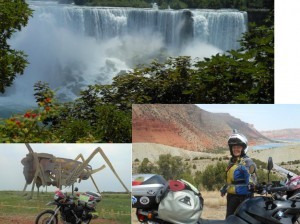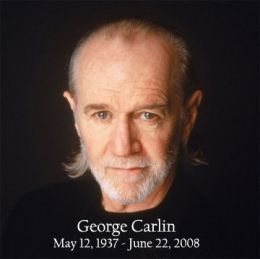Tamela Rich's Blog, page 14
September 6, 2012
Writing a Book with Aaron Katsman for McGraw-Hill
People ask me about my “Goldilocks Chapter” method of ghostwriting and how it has worked out for clients who want a book contract.
Before I answer that question let me answer this one: What’s a Goldilocks Chapter?

I took this shot at Brookgreen Gardens, SC
Remember the story of Goldilocks and the Three Bears? One chair was too big, another was too small and the third was just right; one bowl of porridge was too hot, another was too cold and the third was just right. In similar fashion, a Goldilocks Chapter isn’t the longest or shortest chapter in the book; it isn’t the introduction or the summary. It’s a chapter that represents both the the length and the level of difficulty of the average chapter in the book.
The Goldilocks Chapter gives both me and the author a feel for our future working relationship and gives me a mini project from which to price the entire book. The author can in turn take this chapter to an agent and/or publishing company or decide to self-publish the book. No matter who publishes the book, I can help carry the project over the finish line or the author can go it alone, or with another writer. A Goldilocks Chapter paves the way for other important decisions.
How a Goldilocks Chapter turned into a book contract
 Last year at this time, Aaron Katsman of Lighthouse Capital called me about a book concept. He wanted to write a sample chapter of his book on international retirement investing so that he could get an agent, and ultimately a book contract with a publisher.
Last year at this time, Aaron Katsman of Lighthouse Capital called me about a book concept. He wanted to write a sample chapter of his book on international retirement investing so that he could get an agent, and ultimately a book contract with a publisher.
Aaron is no stranger to writing; he is a noted expert on both the Israeli economy and stocks and is a frequent contributor to both SeekingAlpha.com and The Jerusalem Post. He’s also appeared on CNBC’s Squawk Box. So why did he reach out to me? The same reasons other successful people do: for my time and expertise.
Time: Aaron didn’t want to stop writing his other columns (which would have hurt his book sales anyway), and didn’t have time to write a book by himself in light of his client, family and civic commitments. There are only so many hours in a day.
Expertise: Writing a book is a prolonged project as compared to a column. An experienced writer on your book project can make the difference between loving and hating the experience, especially when dealing with a publisher’s processes.
Given these considerations, it made sense for Aaron to find a writer. We pulled his sample chapter together after a few interviews and three drafts.
Mission accomplished: agent and book contract
Aaron took the Goldilocks chapter to an agent, who helped him with his book proposal and presented it to McGraw-Hill. The result? They bought it, and we’ll deliver it to them by the end of 2012.
I’m working from my office in Charlotte and Aaron is working from his in Jerusalem. We’re using Skype, Google Docs and Evernote to collaborate and stay organized. My hope is that we’ll meet in person around Thanksgiving when Aaron comes stateside to visit family, but if that doesn’t pan out, we’ll make our deadline and meet another time. Perhaps at his book launch party.
OK, you know you want to write a book. You know it would be good for your business reputation. When can we start YOUR Goldilocks Chapter?

August 30, 2012
Helmet Head: Lessons from the Road About Myself
“Helmet head” is a term we motorcyclists use to describe the way our hair looks when it comes out from under the helmet. It’s never pretty. I also use the term for what goes through my mind as I travel under the helmet.
Because you can hardly find a restaurant without a TV blaring away in it, I remember the Boise restaurant I was in when I learned of the Denver movie theater shooting. Being under the helmet and away from the 24-hour news cycle was a blessing, not because I don’t like to be informed, but because NOBODY needs to be barraged by the 24-hour news cycle on a continuous loop of no-longer-news.
A long dose of helmet head helps me detox from addictions I develop during the rest of the year, and each trip has equipped me to lead an incrementally more peaceful life upon return. Here’s what’s on my mind after 60 days and 11,447 miles of helmet head.
“We live in a world where gossip passes for news, and sensationalism passes for journalism.” ~ William Bernhardt, Naked Justice
Helmet Head Musings
STUFF
Every time I packed my duffel I was grateful to have so little to carry and keep track of, and that’s a big change from the person I was four years ago.
Next year I’ll pare down even more, starting with underwear. ONE pair. Don’t be shocked–if you’re only wearing them overnight, you can get quite a few nights out of a pair! (I wear LDComfort top & bottom while I ride; I wash ‘em at night and wear ‘em the next day). I’ll bring two Tshirts, one tank top, a bra, riding socks, sandals, a light zip-up jacket and of course my denim vest. I’ll continue bringing my dress/nightgown, one pair of jeans (hopefully two sizes smaller), and a skort. Sweatpants if I’m tent camping in the cold. THAT’S IT. If I go anywhere that requires anything fancier, I’ll ship it ahead and ship it home afterwards.
George Carlin had it right when he riffed on our relationships with our stuff. George: “A house is just a pile of stuff with a cover on it…” Me: “A house is a place where you store your stuff while you go to work so you can buy more stuff.” A home is something altogether different, mind you, but I digress.
I camped a lot this summer and I met several couples who are ”workampers” at private campgrounds (federal properties have a similar program called “camp hosts”). These folks work at the campground in exchange for rent on their RV site and get paid for time worked in excess of their rent hours. Some do it for a season and others follow the seasons from campground to campground as a way of life. Then there are retirees who sell it all and become RV vagabonds. I had a great uncle and aunt who took early retirement and vagabonded for a dozen years or so before they had to settle down and tend to their failing health. They loved it.
How many life decisions are you making based on your relationship to stuff? I think about this every day as I try to live a life that prioritizes relationships and experiences over stuff. Just don’t ask me to get rid of my library, ok? That make take a few more road trips to even contemplate.
FAMILY
Like any wife and mother, thoughts of my family were with me daily, especially when watching other families interact. People often ask how I “get away with” being on the road for so long, and part of the answer is that my boys are now 20 and 23. The other part lies in our family’s history. My children have seen me crumble, they’ve seen me rebuild and they appreciate the happiness that my road trips bring me. I hope they will some day join me, even for a few days. This year my spouse joined me in Yellowstone and Idaho in the middle of my itinerary, which was a real treat. I’ve never been the kind of person to get homesick, even as a kid at summer camp, but in truth, I think it’s easier to be the one on the road than the one who’s left at home. Thank you, Matt, for accommodating my needs. I’m not an easy person to make a life with.
GOALS
I am a most fortunate woman, making my living doing what I love. But I kept asking myself how I could be of greater service to the world. Here’s where I’d appreciate your ideas. I’m not interested in raising money; I’m interested in raising consciousness, standards and capabilities. Is there a project near and dear to you that could use my help? Thanks in advance for your suggestions.
Timely topic for your business or community group?
I speak to a variety of business and community groups about my travels: the places I see, the people I meet and the changes I see in myself as a result. Several topics are outlined here.
If your organization would like to invite me to speak about mindful minimalism, incremental renegadism, reinventing yourself (or parts of yourself) please get in touch. I really enjoy being part of a group that asks members to bring something to the talk (for donation) that someone else can use — or get more use of — than the donor. This might be a garment, a book, a piece of kitchenware or an automobile, I don’t care. At the end of the talk, the group drops these items off at a local charity, and new spirit is infused in all.
Prefer to just be dazzled by gorgeous photography and a tour of the US and Canada? I can do that too, and throw in an occasional stranded traveler tale to boot.

July 23, 2012
Speaking and Signing Books at Rally in the Gorge 2012
Right after wrapping up at the AMA’s International Women in Motorcycling Conference I’ll head to Stevenson, Oregon for the 10th Annual Rally in the Gorge. I’ve got to make time from Nevada to Oregon because I’m presenting on the first morning of the rally with my friend and motorcycle tour operator Karen Thomson.
This Rally is actually four mini rallies: Sport Bike, Sport Touring, Dual Sport, and Maxi Scoot. I’ll spend most of my time with the dual sport crowd, where I look forward to riding hundreds of miles of scenic roads and discovering the places that can’t be reached without riding off pavement.
Motorcycle rally myth busting
Sadly, when people hear I’m going to a motorcycle rally, they envision a den of inequity and ask me if I’m going to get a tattoo. Sheesh.
Here’s what’s really going on, according to organizer Tom Mehren of Sound Rider. Our national headliner speaker this year is Nick Ienatsch, who was with us in 2008. Nick’s forte, as most know, is in the sport bike field, but did you know he’s also a dual sport rider? And you may see him on an adventure bike during the rally because South Sound BMW has generously agreed to provide Nick with his choice of an S1000RR, R1200GSA, F800R or K1600GT.
Our national headliner speaker this year is Nick Ienatsch, who was with us in 2008. Nick’s forte, as most know, is in the sport bike field, but did you know he’s also a dual sport rider? And you may see him on an adventure bike during the rally because South Sound BMW has generously agreed to provide Nick with his choice of an S1000RR, R1200GSA, F800R or K1600GT.
Those are also the bikes South Sound will have available for you to test ride while you’re there. In addition, Cycle Barn is bringing a selection of Triumph, Piaggio and Zero motorcycles to be test ridden as well.
 On a more local note, Mike Sullivan, a nationally known AMA rider, will join us to run a morning seminar on sport bike mods and then a clinic to help riders learn the finer aspects of hanging off on public roads. Mike wants you moving around on your bike as you ride, no matter where you are, and you’ll find out why during the rolling clinic.
On a more local note, Mike Sullivan, a nationally known AMA rider, will join us to run a morning seminar on sport bike mods and then a clinic to help riders learn the finer aspects of hanging off on public roads. Mike wants you moving around on your bike as you ride, no matter where you are, and you’ll find out why during the rolling clinic.
 There’s always some great off-road fun happening for the dual sport adventure riders. This year, Tim Bernard of Happy Trails will lead a ride/rolling clinic eastward Saturday, and those who join in will get to experience some challenging level two and three road surfaces. Several top instructors from PSSOR will also be offering their dual sport basics class.
There’s always some great off-road fun happening for the dual sport adventure riders. This year, Tim Bernard of Happy Trails will lead a ride/rolling clinic eastward Saturday, and those who join in will get to experience some challenging level two and three road surfaces. Several top instructors from PSSOR will also be offering their dual sport basics class.
 We’re also pleased to announce that Sterling Noren will join us as a guest speaker and provide a special evening presentation about his long career as a moto documentary producer. Regardless of what kind of bike you ride, you’re sure to find Sterling’s adventures exciting as well as educational.
We’re also pleased to announce that Sterling Noren will join us as a guest speaker and provide a special evening presentation about his long career as a moto documentary producer. Regardless of what kind of bike you ride, you’re sure to find Sterling’s adventures exciting as well as educational.
 The always mind opening David Hough will return as a guest presenter. He’ll arrive hot on the heals of his latest book release, Proficient Motorcycling: Mastering the Ride 2nd Edition, which has been re-done from cover to cover. David, Nick and all other authors included this year will have a round table discussion on Thursday night.
The always mind opening David Hough will return as a guest presenter. He’ll arrive hot on the heals of his latest book release, Proficient Motorcycling: Mastering the Ride 2nd Edition, which has been re-done from cover to cover. David, Nick and all other authors included this year will have a round table discussion on Thursday night.

 We have a duo of women presenters who will be coming in fresh from the AMA Women in Motorcycling conference held the weekend before, outside of Reno, Nevada. Author Tamela Rich and tour operator Karen Thomson will provide a number of presentations as well as a morning coffee klatch Thursday.
We have a duo of women presenters who will be coming in fresh from the AMA Women in Motorcycling conference held the weekend before, outside of Reno, Nevada. Author Tamela Rich and tour operator Karen Thomson will provide a number of presentations as well as a morning coffee klatch Thursday.

Signing Books at the AMA International Women and Motorcycling Conference!
Once every three years the American Motorcyclist Association (AMA) hosts an International Women and Motorcycling Conference and this time it’s in Carson City, NV. The organizing committee has planned a variety of seminars and activities designed to appeal to the diversity of motorcycle enthusiasts.
Needless to say I’ll be there as a participant and to sign books.
Friday July 27 4:00 – 5:00 p.m.
Sat. July 28 12:00 – 1:00 p.m.
Sun July 29 9:00 – 10:00 a.m.
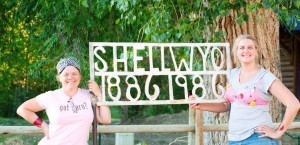
Here I am with Christina in Shell, WY during the 2011 Conga Rally
I’m delighted to be joined at the signing table by Christina Shook, the photographer of my book, Live Full Throttle: Life Lessons From Friends Who Faced Cancer.
Please look me up if you’ll be in Carson City. I’d love to meet you!

July 12, 2012
Lessons on Flexibility and Ego
Every day of each road trip has its own theme. The first week of my 2012 road trip dished up plenty of chances to exercise flexibility and to get my ego in check.
Delayed before Day One
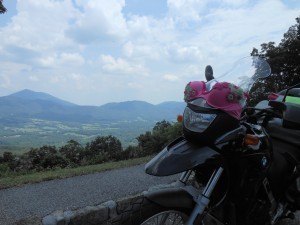
Yes, that's a pink bra on my bike. Click for why
I had planned to leave from the southernmost point of the Blue Ridge Parkway near Cherokee, NC and ride all the way north on it to Skyline Drive in Virginia. I intended to earn a travel badge of honor (of sorts) by taking in every single mile of both legendary roads.
Oh well.
I am a business ghostwriter (will write for gas money and a set of new tires!). Two days before I planned to put the kickstand up, one of my clients received the good news that he was being offered a book contract by McGraw Hill and needed some key points from me that would help him negotiate the contract. I decided it wouldn’t hurt to leave a day late and shave a couple hundred miles off the itinerary, so I did, getting on the Parkway near Asheville, NC, where I rode with my dear friend K.
Detoured on Day Two

Recreation area at KOA, Gettysburg, PA
More flexibility was called for, however. I smashed my phone near the end of the second day of the trip and had to get off the Parkway for good at Natural Bridge, VA to look for a TMobile store, which I didn’t realize was impossible in western VA (Wal-Mart and Costco stores can’t handle insurance claims). Eventually I took care of business at a store in MD, and arranged for the replacement to be shipped to my next stop at the KOA in Niagara Falls, NY. I managed to catch the last segment of Skyline Drive through the Shenandoah National Forest from Gettysburg, PA. If you’d like a more “touristy” account of the Parkway and Skyline Drive, check out my story on SpeedTV.
Lesson: When you can’t meet one goal without jeopardizing more important ones, think strategically, and press on. Travel badge of honor, I’ll get you another day (if I so choose).
Destruction on Day Four
Jill joined me in Niagara Falls and after a sunny day of touring that area en route to Parry Sound, we awoke the next morning to sprinkles with a forecast of steady rain and possibly thunderstorms in the Georgian Bay area of Ontario. We didn’t have a choice to wait for better weather, since Jill had a can’t-miss date with her daughter in Ohio, so we donned rain gear and set out. Real bikers are not rain sissies.
 By the time we reached Sudbury I was cold, wet and hungry. My pants had developed a little portal in a seam and cold Canadian rain was rolling down into my waterproof boots. Dismounting the bike, I sloshed into the Tutti Fruitti restroom (called a “washroom” in Canada) to wring everything out. When I whipped out my camera to take a picture of the beautiful meal you see here, my not-yet-month-old-camera was unresponsive. Fortunately Jill had her phone and snapped one for me. I hadn’t bothered carrying my phone because the international rates are exorbitant and, after all, I bought a CAMERA for pictures.
By the time we reached Sudbury I was cold, wet and hungry. My pants had developed a little portal in a seam and cold Canadian rain was rolling down into my waterproof boots. Dismounting the bike, I sloshed into the Tutti Fruitti restroom (called a “washroom” in Canada) to wring everything out. When I whipped out my camera to take a picture of the beautiful meal you see here, my not-yet-month-old-camera was unresponsive. Fortunately Jill had her phone and snapped one for me. I hadn’t bothered carrying my phone because the international rates are exorbitant and, after all, I bought a CAMERA for pictures.
Speaking of help from Jill, she kindly lent me a pair of rain pants so I could ride the rest of the way in comfort once again. What a doll.
Pulling into Sault Ste. Marie (the Ontario side) for fuel, I had a mini-meltdown when I broke the hinge off my gas cap.
Lesson: This was a case where, like for want of a horse shoe nail, the war was lost (see below), for want of $400 I’ll now be spending $650. How’s this? I’ve been limping along with saddlebags that aren’t quite made for my bike and, short story, by not spending $400 for the right bags, I’ll end up spending $250 to replace the gas cap assembly that got in the way of the “wrong” bags, and still have to spend $400 for the right bags. Sigh.
For Want of a Nail
For want of a nail the shoe was lost.
For want of a shoe the horse was lost.
For want of a horse the rider was lost.
For want of a rider the message was lost.
For want of a message the battle was lost.
For want of a battle the kingdom was lost.
And all for the want of a horseshoe nail.
Day Five Divergence

Niagara Falls, Ontario
Firing up my computer to find the closest Best Buy, where I intended to put in a warrant claim on the camera, the KOA owner in Sault Ste. Marie overheard me talking to Jill about the lack of Best Buy stores in western Ontario. He said the Canadian stores might not honor an American warranty, so I checked and he was right. So once again, I had to make a choice about foregoing a major leg of my journey to deal with equipment failure.
Paying attention to my inner dialogue, I realized how silly I was in the first place for planning to run through many of the same towns in Manitoba and Saskatchewan as I’d traveled through last year. I acknowledged to myself that I’d just planned to do those provinces again for the sake of saying I’d done three provinces in 2012. Travel badges of honor are really just an ego stroke, eh?
Lesson: Put your ego aside and do what calls to you instead of worrying about another notch on your belt.
Delightful detour
[image error]
Note the "Doggles" on this pillion pet! -- Aerostitch sells them
The re-route through the Upper Peninsula turned out to be fortuitous. I loved every minute of it, especially the Great Lakes Shipwreck Museum. I had my first “pasty” in Duluth, MN, where I got the “insider” tour of the legendary motorcycle gear maker and travel outfitter, Aerostitch. In Marquette (MI, not WI), I was introduced to the delicious Cudighi sausage, which I’d never even heard of before.
Not a total bust, by any means
I hope this post doesn’t give the impression that my first week on the road was a disaster. On the contrary, I rode with friends through beautiful country. I met some wonderful people, including the retired zookeeper at the Buffalo, NY Zoo (what stories we could have heard if we’d had an entire day to buy him coffee at Tim Horton’s!). I got to see parts of the US and Canada that I’ll definitely revisit, most notably the the Park to park Trail system in Ontario, 143 miles of trails you can use on foot, bicycle, horse, dog sled, dirtbike, snowmachine, ATV and UTV. Yes, I said dog sled, this being Canada and all!
Most important, I learned about the danger of negative self-talk. I whipped myself into a downward spiral of self-doubt for no reason at all. I started thinking superstitious thoughts like, Are my equipment failures trying to tell me something? Should I quit while I’m ahead? Sometimes equipment failures are just that.
[image error]
Jill and I install "Guerrilla Knitting" at The Big Nickel in Sudbury Ontario
By the time Jill left in Sault Ste. Marie I wasn’t in the right frame of mind to go any further. I extended my visit there by a day and just napped, took care of client work and got to know the area. Sometimes I find that I just have to hold space for my doubts and darker thoughts with the promise that once I’ve given them their due, they need to make room for more productive thoughts and feelings. Sure enough, by the time I returned from an all-day train trip from Sault Ste. Marie to the Agawa Canyon, in the company of a lovely couple from Wisconsin and to the serenades of some Mennonite children signing hymns on the Agawa Canyon train, I was ready to get back on the bike.
If you love pictures, here’s my Flickr site for my 2012 road trip. I update it as wireless connectivity permits! And again, here’s an account of the marvels of the Blue Ridge Parkway.
I’ll post again ASAP.

May 21, 2012
My Breast Cancer Advocacy Focus: A Big Shift
I never set out to be a breast cancer advocate.
Two years ago I was looking for a good cause to align with, as I set out on a cross-country motorcycle trip. When I asked people for suggestions, breast cancer of course came up, but it wasn’t my first choice for a cause. The proliferation of pink events and high-profile news stories for breast cancer made me think I should turn my efforts to something that actually needed some help. Breast cancer seemed to be doing fine without me.
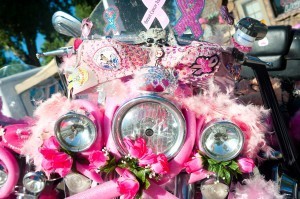
How's this for pink bling?
But when I found out about a group of women from the US and Canada who rode their pinked-out bikes each summer to raise money for breast cancer research, things took off for me. I checked the Charity Navigator scores of the beneficiaries I raised funds for, and thought my due diligence was complete.
I strapped a pink bra across the windshield of my own motorcycle, a modest effort compared to some of my fellow bikers (like the one pictured right), but nonetheless, people were attracted to that bra. They knew I must be doing something for breast cancer, and stopped me to tell me their story or the story of someone close to them. There were times I’d hear one story at the gas pump, another in the bathroom, and more in the concession area. I had no idea there was so much cancer in the world. My book, Live Full Throttle: Life Lessons From Friends Who Faced Cancer was born of these conversations from the road with strangers and from my fellow motorcycle riders.
Where’s all that money going?
This year, as I began touring with my book and preparing for my annual road trip, I decided to scratch the mental itch I’d been feeling, the one that suggested there might be something more important I could do for breast cancer causes than raise money. As I deepened my understanding of the cancer charity landscape, I learned that a well-run, high-scoring charity could nevertheless be pouring money into programs that have nothing to do with preventing or curing the disease, the things that interest me most.
I wondered why there was so little money being spent on the environmental and nutritional factors that contribute to cancer rates, and why so much money was channeled to pharmaceutical companies, which make drugs that don’t prevent cancer at all. I started digging, and my research led me to the film Pink Ribbons, Inc. based on a book of the same title.
Pink Ribbons lays bare the conflicting interests of those claiming to have a passion for curing breast cancer, including some of the most-recognized breast cancer charities. The movie also examines how people have been lured into shopping for a cure instead of being activists–holding charities, companies, governments and other institutions accountable for reducing the incidence of all forms of cancer.
I learned that while the Susan G. Komen Foundation has donated over $600m to basic clinical research and the annual Avon walks have raised over $380m for breast cancer causes, there is little to no coordination for the research that’s funded and indeed. The lion’s share of research dollars go to Big Pharma, which has no economic interest in curing the disease. The US federal government’s National Cancer Institute leads 37 agencies, yet there is an endless repetition of research that seeks to find an incremental increase in life (rather than prevention or true cure). Few are researching the kinds of cancers that metastasize.
The vile business of “pinkwashing”
I also learned about the vile practice of “pinkwashing,” which occurs when companies that produce products that increase the RISK of breast cancer also MARKET these same products to BENEFIT breast cancer. Avon is guilty of pinkwashing, since it both sells cosmetics that are laden with carcinogens and uses the breast cancer cause to sell those cosmetics (see the above statistic on money raised). Revlon and Estee Lauder are equally guilty, but pinkwashing transcends cosmetics peddlers. Ford Motor Company is another (of many), since it markets its Ford Mustang to breast cancer patients, while its manufacturing processes are linked to all kinds of cancers.
I’ve decided there should be a special place in hell reserved for pinkwashers like Eli Lilly (because our courts have now decreed that corporations are people, I guess that means they also have a hereafter). Lilly is the only company in the world making and distributing rBGH, an artificial growth hormone found in many dairy products that is linked to increased risk of breast cancer. Eli Lilly also manufactures breast cancer drugs. That’s a highly lucrative profit cycle, deserving of outrage.
Here’s what I learned about the pink ribbons industry from Pink Ribbons, Inc.:
Pharmaceutical companies use money to provide a marketable product, something that will increase survival for a period of time — even three weeks — but which can be very profitable for that slight period of time. “They don’t seem to be interested in prevention, but this is how capitalism works.” ~Ellen Leopold, author of A Darker Ribbon: Breast Cancer, Women and Their Doctors in the Twentieth Century
Big players on the nonprofit boards of the “cancer establishment” are filled with members from pharmaceuticals, chemicals and energy industries. This is a co-mingling of those responsible for the perpetuation of the disease with those trying to cure/prevent it. ~Dr. Samantha King, author of Pink Ribbons, Inc,: Breast Cancer and the Politics of Philanthropy
Of all the millions raised, only 15% goes to prevention; only 5% of research goes to the environmental cause of breast cancer.

Dr. Susan Love
What science knows–and doesn’t–about breast cancer
Here’s what I learned about the disease itself:
>50% of women who are diagnosed with breast cancer don’t have one of the major risk factors that we know about…but most of the research is not targeted at answering those questions.”~ Dr. Mhel Kavanaugh-Lynch, Director of the California Breast Cancer Research Program at the University of California
“Slash, burn and poison*…is what you do when you don’t understand (the disease).” Dr. Susan Love, President & Medical Director of the Susan Love Research Foundation
“Only 20-30% of breast cancer happens in women with risk factors. If we can only explain 20-30% of breast cancer, we don’t know what causes it. We’re missing something big and if we keep looking at the same risk factors we’ll miss it.” ~Dr. Susan Love, President & Medical Director of the Susan Love Research Foundation
There are three categories of people who get a cancer diagnosis from a mammogram:
Those who have treatable forms of breast cancer, for whom early detection saves lives
Others who have something that will never be life threatening, and if it’s treated, the treatment makes them sick/kills them
Those who have a form of the disease that’s so aggressive that no currently-available treatment is going to heal, no matter how quickly it’s found
Questioning our worship for the workings and intelligence of free markets
I’ll never look at cause marketing the same way. THIS is what happens when we throw important public health issues out to the markets for resolution. OK, that decision will take a while to reverse, so in the meantime, how do intelligent, concerned and earnest breast cancer advocates work within this landscape?
Breast Cancer Action suggests asking these five questions before you use your purchasing power to “benefit” breast cancer campaigns
1. How much money from your purchase actually goes toward breast cancer? Is the amount clearly stated on the package?
2. What is the maximum amount that will be donated?
3. How are the funds being raised?
4. To what breast cancer organization does the money go, and what types of programs does it support?
5. What is the company doing to assure that its products are not actually contributing to the breast cancer epidemic?
What this means for my 2012 road trip
I’m still going to travel with a pink bra on my motorcycle. But instead of raising money, I’m going to educate.
While we live in a toxic world, we have SOME choices for what we expose ourselves to. Personal care products are a starting point for my education efforts. I want to help people prevent cancer or decrease their chance of contracting it, so I’ll hand them cards with links to both the Environmental Working Group’s Skin Deep database and to Good Guide, where they can research the products they buy for health, environmental and social responsibility
How about it, readers? What do you think I should do with my advocacy efforts? How would you like to join me?
*slash=surgery, burn=radiate, poison=chemo

April 17, 2012
Pink Ribbons, Inc. Film Screening and Panel Discussion
Are you interested in cause-related marketing?
Does someone you know have cancer?
Are you raising money for a nonprofit?
Whether you have a personal interest in breast cancer, non-profit fundraising or cause-related marketing, there’s plenty for you to think about in the new documentary film, Pink Ribbons, Inc.
Online Ticketing for Charlotte Screening: Pink Ribbons, Inc. powered by Eventbrite
Instead of marching against the man, we shop for a cure
Pink Ribbons, Inc. looks at how the breast cancer movement has moved from activism to consumerism and challenges viewers to rethink their assumptions about the meaning of breast cancer in our society.
Featuring interviews with an array of experts, authors, activists and medical professionals, the film also includes the participation of leading players in breast cancer fundraising and marketing. It also addresses the disturbing practice of “pink washing,” which is when a company that manufacturers products that increase the risk of breast cancer in turn raises money to fight the disease.

Talk back to the experts
After the film, I will facilitate a panel discussion with these experts:
Tracy Cook-Brewton, of the Sisters Network Carolinas, Inc., which serves the breast health needs of African-American women, will address the point that breast cancer is marketed as a disease that strikes middle-class Caucasian women. She will provide information about how this affects access to care and treatment.
Ann Fox, PhD, Associate Professor of English and Gender Studies Concentration Coordinator at Davidson College, is interested in the “prettiness” versus “power” factor of the ubiquitous pink ribbon.
Susan G. Komen for the Cure Outstanding volunteer of the year (2012) and Interim Director of the Charlotte Komen affiliate, will address the role of Komen affiliates, their degree of autonomy from the parent organization and the $5m granted in the local area to underserved breast health needs.
Rosemarie Tong , PhD, Distinguished Professor of Health Care Ethics in the Department of Philosophy and Director of the Center for Applied and Professional Ethics at UNC Charlotte, will speak to the ethical questions raised in the film.
I became involved with the breast cancer cause when I joined a group of women riding their pink-decorated motorcycles across the United States and Canada. When I decorated the windshield of my bike with a pink bra, people at gas stations, scenic overlooks and restaurants told me stories about cancer–theirs, a family member’s, a co-worker’s. These stories moved me to do something more than raise money. With this event, I’m also raising awareness for how we fund research, care and cures, and I’m asking our community whether commercialism and cause-related marketing is the best or only way we should paraticipate in efforts to eradicate the disease.
Proceeds from the event will benefit drumStrong, which raises awareness and funds for global cancer organizations.
Thanks to my pals at The Marketing Squad for discussing this topic with me from a marketing/branding perspective. Catch the podcast here (cue it to 22:00 for my segment).
Online Ticketing for Charlotte Screening: Pink Ribbons, Inc. powered by Eventbrite
Pinkwashing
This graphic does a better job describing it than 1000 of my words could.

March 23, 2012
Signing and Speaking in Seattle!
I love my life. I get to travel, ride motorcycles and meet great people for a living! If you're in the Seattle area the first week of April, please get in touch. I'd love to grab a cuppa and hear YOUR story.
Signing books and riding motorcycles
[image error] On Friday, March 30 I'll hit Seattle at 11am and be signing books at South Sound BMW by noon!
The South Sound team has asked me to stay until 2pm or until the throngs (ha!) disperse.
You know how much I love the Roundel, right? Well, I'll be riding a F650GS around Seattle for five days thanks to TourUSA Motorcycle Rentals. I've ridden the F650GS before and look forward to its responsiveness in metro traffic. The only version of the GS line I absolutely cannot ride is the F800–I can't even get my leg high enough to swing it over the seat!
East Coasters, if you want to ride the Pacific Northwest but don't have time to ride all the way out there, consider renting from TourUSA and tell them I sent ya.
Saturday, March 31
I'll be learning how to "ride like a cop" on a big CHiPs bike at Northwest Motorcycle School. I've never had a desire to OWN a big honking bike, but I'm looking forward to learning how to operate one (in a bucket-list kind of way).
I'll be joined by two or three of my fellow Conga riders — that alone will make it fun for the spectators! I'll bring the helmet cam. This school runs rain or shine, and as I've learned before, rain adds a layer of complexity to the learning experience; but I agree with the old saw that smooth seas do not make skillful sailors.
Tuesday, April 3 at Seattle Cancer Care Alliance
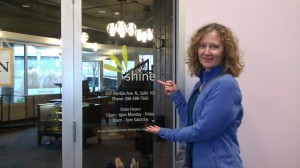 When I visited Seattle a couple of months ago, the managers of Seattle Cancer Care Alliance's cancer speciality store, Shine, fell in love with Live Full Throttle. They asked me to come back to sign books and speak to the patients staying in the SCCA House and the SCCA patient education department asked my Conga sis, Karen (pictured left), to team up with me for a evening presentation open to the entire community.
When I visited Seattle a couple of months ago, the managers of Seattle Cancer Care Alliance's cancer speciality store, Shine, fell in love with Live Full Throttle. They asked me to come back to sign books and speak to the patients staying in the SCCA House and the SCCA patient education department asked my Conga sis, Karen (pictured left), to team up with me for a evening presentation open to the entire community.
We have plans to razzle dazzle 'em when we're there April 3. We'll start with a book signing/mix-&-mingle from 4-6pm and continue upstairs for the "formal" presentation from 6:30-8pm. Both events are free and we'd be delighted to speak to a full house! SCCA is at 207 Pontius Ave. North, Suite 101, Seattle.
Karen's story
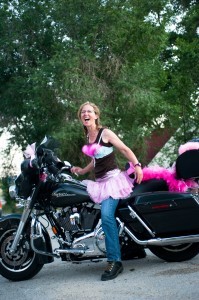
Karen cracking up in Shell, WY 2011
Karen's got such a great story to tell–if you have a copy of Live Full Throttle, her story is in Lesson Four: You're Terminal Too, Embrace It. Here's an excerpt:
Given an eight-year prognosis, Karen says that while you can rail against it, pout, whine, deny, and try every new treatment, the real choice is whether you face cancer as a victim or a survivor. In the words of a true Pacific Northwesterner she resolved, "I'm not dead yet; I'm going to pilot this." She doesn't tell people she's sick, "I'm no different than anyone else, I just have cancer."
Karen had always wanted to learn how to drive a motorcycle but put it off because she was afraid she'd really love it and would therefore have to "do something about it." She was right. I met her during our 2010 Conga, when she had been riding just a little over a year. By the time we met again in 2011 she was one of very few to pass a grueling motorcycle course designed by law enforcement officers to help civilians drive like cops.
If you've ever wanted to learn how to live life with a gift you never wanted, Karen's got an inspirational message for you!
I'm hoping to get time with the good folks at Gilda's Club, Cancer Lifeline, American Cancer Society Breast Cancer Resource Center, and a couple of Meetup groups while I'm in Seattle. Please let me know if there's someone else in the area I need to know, ok?

February 13, 2012
Meet Me in Las Vegas!
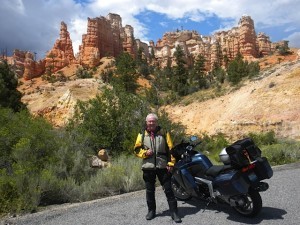
My dad on his BMW K bike in Colorado
Mid-February I'll be in Las Vegas spending time with family and bikers (in my dad's case, that's an overlap!).
If you are anywhere in the Las Vegas area please look me up:
Women in the Wind Winter Ride In 2/16-19
BMW Motorcycles of Las Vegas 2/17/12 at 5pm
RideNow Powersports on Boulder 2/18/12 at 9am (including breakfast!)
My friend and Live Full Throttle collaborator, Christina Shook, will join me for a private signing event Sunday. This will give us a chance to practice our delivery for future events, including (we hope) the AMA Women in Motorcycling Conference in Carson City this July.
If you'd like to sponsor a signing event or recommend a conference please get in touch.

January 25, 2012
Breast Cancer,Inc.: Breast Cancer as an Industry
Since my involvement with breast cancer causes, I've become acutely aware of the commercialization of the disease. Looks like this filmmaker is ahead of me.
I see that the film will be shown in Richmond, VA on 2/10/12. My mother-in-law, whose breast cancer metastasized into bone cancer, is buried there. I'm inclined to go up and see the film and the panel discussion afterwards.
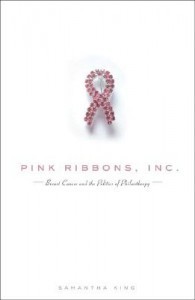 The film draws heavily on the book, Pink Ribbons, Inc. Breast Cancer and the Politics of Philanthropy.
The film draws heavily on the book, Pink Ribbons, Inc. Breast Cancer and the Politics of Philanthropy.
Breast cancer advocacy is being transformed from meaningful civic participation into purchasing products.
The pink ribbon has come to symbolize efforts to find a cure for breast cancer. But it has also become a powerful symbol for corporate philanthropy, boosting the image of corporations, that promote products from yogurt to cars, slicing off a portion of proceeds to support breast cancer research. King, a women's health issues scholar, explores the phenomenal growth of Pink Ribbons Inc.; the annual massing for the Susan G. Komen Foundation's Race for the Cure 5K runs; and other high-profile events with huge corporate sponsorships. However admirable the effort to find a cure, King argues that it overwhelms efforts to learn how and why women get breast cancer and how it can be prevented. Prevention efforts could help more low-income women who lack the means to pay for treatment. King examines the history of philanthropy and how breast cancer became such a prominent cause, garnering far more support and publicity than other diseases, demonstrating the ability of American women to flex their political and economic muscle on behalf of an important cause. ~Vanessa Bush Copyright © American Library Association. All rights reserved


